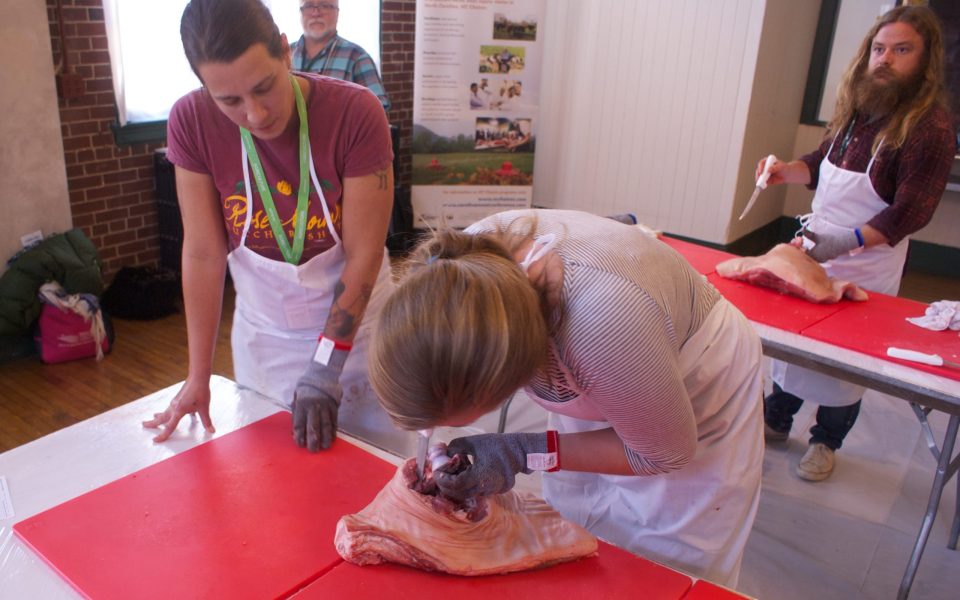by Eric Ginsburg
Pointing to a wrinkle in the armpit of the pork shoulder, Tyler Cook explained to his dozen or so butchery trainees where to cut.
Standing at the front of the room with what looked like chainmail on under his white apron and a holster with four butcher’s knives at his left hip, Cook demonstrated the method on a shoulder in front of him.
“You don’t want to be parallel, you want to dig in so this cut is muscle-y,” he said. “So score all the way around, and then cut all the way to the bone… If you’re at the joint, you went a little too far down.”
At six tables, pairs facing him tried to replicate the technique. Almost half of them were women, and for many in the group it was their first time doing anything like this.
For Sarah Campbell, who stood in the second row with a glove on her left hand and a large knife in her right, Cook’s seminar on Monday gave her a chance to see the other side of pork production. She lives with her fiancé on her family’s land, Celestial Roots Farm outside of Washington DC, and raises pigs, among other things. Campbell wanted to experience the processing part of the industry, in part because it would help her better explain her product to potential buyers. Cook’s workshop, held as part of the NC Choices Carolina Meat Conference on Monday in Winston-Salem, provided Campbell with the easiest opportunity.
With the help of a scholarship aimed at entry-level female butchers like herself, Campbell was able to attend the statewide conference even though she hasn’t lived around here since she graduated from Guilford College five years ago.
Cook, a butcher at Foothills Deli & Butchery in Asheville, circled around to the various tables to check on Campbell and the other students, helping when needed and providing additional insight.
“You have your cut in the right spot,” he said to one pair struggling to find the joint. “You have to start here and work your way down.”
As another team found the place they were looking for he said, “And that horribly disgusting sound means you’re doing it right.”
At a third table, he helped one woman slide the knife into position and she remarked: “So I was down too low.”
“Yes you were too close to the picnic and not close enough to the shank,” he said.
[pullquote]Learn more at carolinameatconference.com. [/pullquote]Cook’s workshop took place in a side room at the Millennium Center, hidden past all of the conference display tables and at the opposite end of the facility from workshops where people discussed everything from recipes for feed rations to soil samples and grazing techniques. The hands-on butchery lessons — covering rabbit earlier that morning and lamb the following day — were a parallel track to the main conference event, and only attended by a select few. But in several ways, it still reflected the larger statewide conference around it.
Campbell, for example, was far from the only person who traveled from out of state for the event. A processing equipment manufacturer from upstate New York sat next to a Greensboro-based duck farmer during the Monday night keynote address, and on her other side, a man who flew in from California because “North Carolina’s got it going on” when it comes to agriculture in general and raising animals for dairy and meat in particular.
Cindy Flowers — the duck farmer — and Campbell represent a cohort of those in attendance: younger, college educated and in some cases, holding down another job. Flowers, the marketing manager at Deep Roots Market in Greensboro, and Campbell, who commutes to a day job in DC at the National Farmers Union, were among hundreds of attendees with an assortment of reasons for being there.
Educators. Family farmers. Attorneys. Marketers. Restaurateurs. Meat packers. Authors.
They took turns marveling as Cook displayed his butchery techniques in a pop-up demonstration near the beer stand before dinner Monday. Hillary Kimmel — who runs the small Pine Trough Branch Farm with her husband about 20 minutes outside of Greensboro and sells their product at farmers markets in Greensboro and Winston-Salem — chatted with Campbell nearby about the kinds of pigs each raised, noting that Cook was using one of her pigs for the demo.
Not long into the conversation someone cut in to introduce himself; he’s in the States from South Africa as part of a three-week agricultural exchange, he said, and this conference is part of the deal.
That’s the thing about the Carolina Meat Conference — just when you think you have it pegged, the breadth of its scope will surprise you.
Join the First Amendment Society, a membership that goes directly to funding TCB‘s newsroom.
We believe that reporting can save the world.
The TCB First Amendment Society recognizes the vital role of a free, unfettered press with a bundling of local experiences designed to build community, and unique engagements with our newsroom that will help you understand, and shape, local journalism’s critical role in uplifting the people in our cities.
All revenue goes directly into the newsroom as reporters’ salaries and freelance commissions.





Leave a Reply